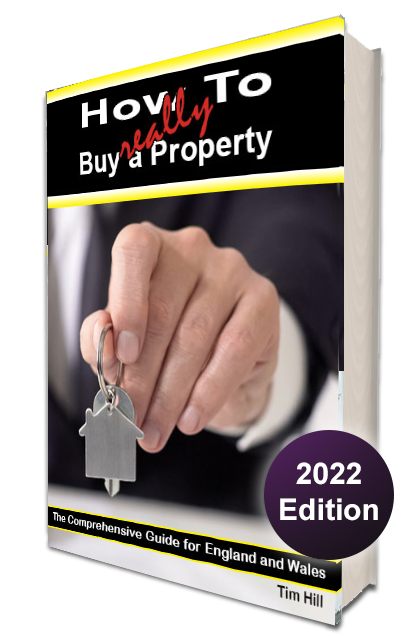What does 'Agreement in Principle' mean when buying a property?
Find out what Agreement in Principle means when you are buying a property. 'What does Agreement in Principle mean?' plus over 150 other property related terms and jargon in plain English
Agreement in Principle
You might have just stepped out the door at the start of your property search and the first question an estate agent asks you is "Do you have an Agreement in Principle" ... or if they are trying to impress you with jargon, "Do you have an AIP".
What do they mean? What is an AIP? And why do you need one if you haven't even been on a viewing yet?
An Agreement in Principle is when a bank or lender says "If what you have told us about yourself is true we agree to lend you £X if we think the property is worth it".
OK, lets rewind a little. If you need to get a mortgage in order to buy a property, and most people do, you're going to need to persuade someone to lend you the cash.
The lender is going to think "How much can I lend this person and feel fairly safe that they will pay it back".
They want to lend you as much as possible because then they'll make lots of profit from the interest they'll be charging but at the same time if they lend you too much you won't be able to afford the payments and they'll have to go through all the hassle of taking the property off you and trying to sell it themselves for a price which covers your loan and their expenses.
To strike the right balance lenders will ask you things like: how much do you earn, how long you have been earning that amount, what other debts you have, how do you like to spend your money day to day? Basically have a good old rummage around in your private life.
And I do mean rummage - if you love clubbing and pay for your drinks by swiping your card don't think they won't find that out eventually and consider that a factor!
But to begin with they'll just ask you and assume you tell them the truth. Based on what you say they'll then come up with a figure they are prepared to loan you. This document is known as the Agreement in Principle.
"In principle" - this is theoretically possible.
There are three reasons why you might not want to go any further than this:
- Cost - if they were to verify everything you had told them its going to take time and money.
- Credit Ratings - every time a lender goes to a credit agency to ask about you your credit rating takes a bit of a hit. If 9 lenders ran credit checks on you that would be 9 hits. By the time the 9th credit check is being carried out your rating might start to look a bit shakey.
- You don't know you can - there is a step beyond Agreement in Principle, I'll come to it in a moment.
The whole - check my credit rating equals hurts my credit rating - is an odd one. The theory behind it is that if you are applying for lots of loans you must be in financial trouble ... or you will be when all those loans are approved.
That's fine in everyday life but you really wouldn't take on two mortgages so the system is a bit defunct for property buying ... but there you go, that's how it is. You can, on the other hand, get as many Agreement in Principle's as you like and your credit rating will go untouched.
Sticking with an AIP
Agreements in Principle are a way of helping you decide which lender to go with. Seriously do this before you start viewing or your going to end up doing it in a panic when you've found the property you want to buy.
It's also a great way to show estate agents you are a serious buyer who has planned ahead. You're more likely to be someone who will buy successfully so when a new property that suits you comes on the market you're the first number they call.
You can get AIPs online from most lenders or you can go through a mortgage broker who might be able to get you a better deal because they deal on large volumes of mortgages (more on this in Chapter 11: Sorting Out Your Mortgage.)
Once you've found a property you like and had an offer agreed then you contact the lender you want to go with and they say "Yeah, you know that Agreement In Principle ... well prove it" and you have to send them everything from payslips to credit card statements to bank statements while they scurry off to a credit agency for your credit rating.
At the same time they'll want to know all about what you are buying by carrying out a survey on the property and waiting on a report from your solicitor that, legally, everything is in order.
Beyond an AIP
Now, as I've said, an Agreement in Principle is a big tick in estate agent's eyes and moves you towards the front of the queue. But if you really want to be at the front of the queue and to speed up the buying process no end what you really want is a Pre Arranged Mortage (PAM).
This is where you look at the Agreements in Principle that you have requested, choose a lender and say "OK, here are all the financial documents you say you will need and go ahead and credit check me".
Not all lenders offer this and some lenders charge because there is still no guarantee you are going to take the loan from them. Even those that do don't push the service that much so you may need to ask - this is one of those 'industry insiders' trick.
When they come back and say "Alright, you check out" you have a Pre Arranged Mortgage (PAM).
Or, to go right back near the beginning they change an AIP statement "If what you have told us about yourself is true we agree to lend you £X if we think the property is worth it" to a PAM statement "We agree to lend you £X if we think the property is worth it".
By getting all that paperwork out the way before you make an offer then the only thing the lender needs to check when you have found the place you want to buy is if the property is worth the price you offered. That can save some serious time and make the process from Sale Agreed to Exchange of Contracts faster, smoother and less stressful.
It also means you are one of the highest quality buyers an estate agent will have on their books so they are more likely to call you first when the right property comes onto the market.
You can find out more about this and all the tricks to becoming a buyer who stands out from the crowd in my ebook How to Really Buy a Property.
Warning: Undefined array key "search_words" in /var/www/vhosts/howtoreallybuyaproperty.co.uk/httpdocs/include-text-search.php on line 3
Warning: Undefined array key "search_words" in /var/www/vhosts/howtoreallybuyaproperty.co.uk/httpdocs/include-text-search.php on line 4
Search Results for 'Agreement in Principle' in
How to Really Buy a Property
Warning: Undefined variable $guide in /var/www/vhosts/howtoreallybuyaproperty.co.uk/httpdocs/include-text-search.php on line 155
Warning: Undefined variable $guide_result_num in /var/www/vhosts/howtoreallybuyaproperty.co.uk/httpdocs/include-text-search.php on line 60
Warning: Undefined variable $guide_result_num in /var/www/vhosts/howtoreallybuyaproperty.co.uk/httpdocs/include-text-search.php on line 61
Search Results for 'Agreement in Principle' in
Property FAQ
There were no results for 'Agreement in Principle' in Propery FAQ
Search Results for 'Agreement in Principle' in
Property Terminology
Warning: Undefined variable $term_result_num in /var/www/vhosts/howtoreallybuyaproperty.co.uk/httpdocs/include-text-search.php on line 247
Warning: Undefined variable $interm in /var/www/vhosts/howtoreallybuyaproperty.co.uk/httpdocs/include-text-search.php on line 259



